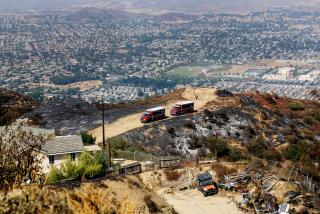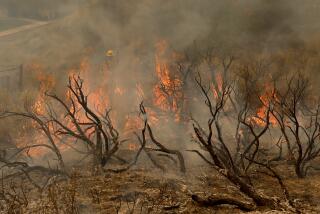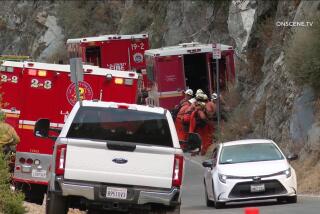Record New Mexico fire rages, but officials see signs of hope
Firefighters gained little ground Monday against the largest forest fire in New Mexico’s history, but officials saw signs of hope: Weather should stay stable this week, and the fire’s fuel is beginning to run out.
The U.S. Forest Service also identified two pilots who died Sunday fighting a blaze on the Nevada-Utah border. An air tanker carrying Todd Neal Tompkins and Ronnie Edwin Chambless, both of Boise, Idaho, went down in the rugged mountains of western Utah as they dropped flame retardant on the 5,000-acre blaze.
In New Mexico, the Whitewater Baldy Complex fire has devoured 400 square miles of forest. The lightning-sparked blaze was 18% contained Monday night, barely up from 17% on Sunday.
“We haven’t seen much change in containment, but they’re starting to get confident with the lines,” forest service spokeswoman Linda Torgerson Gonzales said Monday in an interview with the Los Angeles Times. “If everything holds stable, we’re certain to get a handle on things.”
The local sheriff’s office also indicated optimism on Monday, lifting the fire’s only residential evacuation order. Mogollon, N.M., a privately owned ghost town on the National Register of Historic Places, had been evacuated May 26. The forest service wrapped the town’s 20 homes in fire-resistant foil and kept them damp. No homeowners reported damage. The public will be allowed to return Wednesday, Gonzales said.
Extreme drought in the Southwest has made conflagrations like this more common. The second-biggest blaze in New Mexico history was the Los Conchas fire, which destroyed more than 230 square miles of forest last summer.
The winds are still too strong and flames still too high for crews to dig fire breaks, the most direct method of fighting forest fires, Gonzales said. Instead, crews are using wood chippers and low-intensity fires to destroy flammable debris before the fire reaches it.
“With the winds blowing like this, you can’t get in front of them,” Gonzales said. “All it takes is hot, dry and windy. Anything can create a spark.”
Firefighters are also banking on the fire running out of fuel, Gonzales said. Dense pine trees in the Gila National Forest fed the initial blaze, but the brush on the fire’s outer edges doesn’t have enough substance to keep feeding the flames.
Crews also had to contend with 85-degree temperatures Monday. It will be hot, dry and sunny for the rest of the week, with low humidity and winds of 10-15 mph, the National Weather Service said.
Firefighters will see similar conditions on the Nevada-Utah border, where Tompkins and Chambless died Sunday. The White Rock Fire had consumed nearly 12.5 square miles Monday.
“On behalf of the entire Interior family, I extend my deepest condolences to the families, friends and co-workers of the two courageous men who gave their lives on Sunday,” Secretary of the Interior Ken Salazar said in a statement. “Their loss is a stark reminder of the risks endured by the men and women who fight the wildfires that threaten lives and property across the West, and especially by those who take up that challenge from the air.”
laura.nelson@latimes.com
ALSO:
Big soda ban in N.Y.: Opinions could fill 32-oz. cup
Utah school pulls picture book about lesbian parents
Zimmerman’s lawyer: Hidden money ‘has undermined his credibility’
More to Read
Sign up for Essential California
The most important California stories and recommendations in your inbox every morning.
You may occasionally receive promotional content from the Los Angeles Times.











